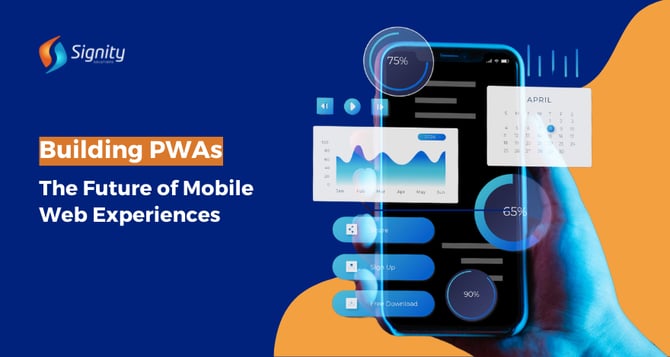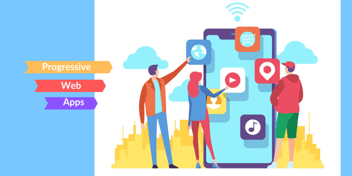Building Progressive Web Apps (PWAs): The Future of Mobile Web Experiences
Progressive web apps are the future of web and mobile app development. With its functionalities like offline accessibility and automatic updates, PWA development is a key to digital transformation. Check the blog to explore how it can help your business in several ways.

The mobile web is evolving, and Progressive Web Apps (PWA) are at the forefront of this transformation. PWAs are known to leverage modern web technologies to deliver native-like features such as offline accessibility, push notifications, and home screen installation while maintaining the inherent benefits of the web, such as easy discoverability and cross-platform compatibility.
But "what is a PWA progressive web app?" PWA is a kind of web application that combines the best features of traditional websites and mobile apps to provide users with a fast, reliable, and engaging experience across all devices.
Building progressive web apps for your business can significantly enhance the mobile experience that rivals native apps without the high development and maintenance costs.
Hence, partnering with the right web app development services will ensure that you provide an engaging user experience, boost user engagement, and enable offline functionality.
This blog will help you discover how PWAs are the future of mobile web experiences and the top benefits that your business can gain from them.
First, let's take a look at the characteristics that make PWA apps different and better from traditional web and native apps.
Key Takeaways
- PWAs offer a seamless, engaging experience with responsive design, offline functionality, and push notifications.
- PWAs reduce costs by using a single codebase for multiple platforms and allowing easy updates without app store approvals.
- Progressive Web Apps load faster and work offline using service workers, ensuring reliable performance in low connectivity environments.
- PWAs can be indexed by search engines, improving visibility. They also offer enhanced security and easy installation from the browser.
What Sets Progressive Web Applications Apart?
It is the features and functionalities that make PWAs the best choice for mobile app development. When you hire progressive web app developers, you will be guaranteed better app performance. Features that make PWA different from traditional web apps and native mobile apps are:
- Responsiveness: As PWAs are naturally responsive, they can adjust their layout and design to work best on any kind of device, including smartphones, tablets, and desktop computers.
- Offline Capabilities: PWAs can access and interact with the app even when a user is offline or has a bad internet connection by using service workers to cache important resources and content.
- App-Like Interface: PWAs aim to offer a seamless user experience with smooth transitions and interactions, just like an app.
- Cross-Browser Compatibility: PWAs are made to function flawlessly across many browsers and devices. This guarantees that users will always have the same experience, regardless of the hardware or software they choose.
- Search Engine Optimization: Since PWAs are essentially websites that can be searched and rated, they benefit from improved discoverability through search engines.
- Lower Development and Maintenance Cost: Progressive web applications can drastically save development and maintenance costs by utilizing a single codebase that spans numerous platforms.
The points above prove why PWAs are a better choice to enhance user experience.
Benefits of Progressive Web App Development for Businesses
The top 13 benefits of progressive web app development for businesses across all industries include:
1. Improved Performance and Faster Loading Time
Comparing Progressive Web Apps with traditional web pages and mobile apps, PWAs offer noticeably better performance and faster loading times. It is accomplished using optimized codes and effective caching techniques.
A crucial element of PWAs is service workers, which enable selective resource caching. This guarantees that material that is regularly visited is always accessible, even when the user is offline or has a bad internet connection.
For instance, BookmyShow's PWA is 54 times smaller than the Android app and 180 times smaller than the iOS app, helping it deliver an 80% increase in conversions.
2. Offline Functionality
One of the best features of Progressive Web Apps (PWAs) is their ability to provide offline functionality, enabling users to access content and features even without an active internet connection. This is made possible through the use of service workers, which act as proxy servers between the web application and the network.
Businesses particularly benefit from this offline capability because it guarantees that their clients can interact with the application, access critical data, and finish transactions even in locations with spotty or intermittent internet connectivity. This enhances user satisfaction and fosters a stronger sense of customer loyalty.
3. Increased User Engagement
PWAs can drastically boost user engagement as they provide an app-like experience through push notifications. Push notifications are a powerful tool that PWAs utilize to notify users in advance of updates, new content, or time-sensitive information.
This keeps users on the application and encourages continuous engagement. Furthermore, PWAs are made to imitate the responsiveness and interactivity of native mobile apps, offering a smooth and engaging user experience.
Pinterest increased its user engagement by 60% after rebuilding its mobile site as a PWA.

4. Lower Development and Maintenance Costs
When it comes to development and maintenance, PWA apps are far more cost-effective than creating native apps for various devices. This is because PWA development does not require building and managing separate codebases for different platforms.
Developers can build the PWA with a single codebase, helping reduce the ongoing costs associated with maintaining and updating separate native apps.
A ServiceNow business process consultant can guide the process of optimizing workflows and ensuring smooth integrations.
Further, a progressive app can be easily updated directly from the web server without mobile users to update the app or wait for app store approvals manually.
5. Shorter Development Cycles
Another key benefit of PWA mobile development is its ability to leverage the existing technologies, resulting in shorter development cycles. These are built using web development tools and frameworks like HTML, JavaScript, and CSS, which the majority of mobile application developers are already proficient in.
As a result, companies can take advantage of their current infrastructure and web development knowledge instead of needing to spend money learning the new, platform-specific tools and tech needed for native app development.
6. Reduced Bounce Rates
For organizations, Progressive Web Apps (PWAs) significantly lower bounce rates and raise conversion rates. PWAs offer customers an app-like experience, enhanced performance, and an offline capability that makes for a more seamless and interesting interaction.
One example can be seen when Thomas Kent lowered its bounce rate by 57% after launching its progressive web application.
PWA development's improved loading speeds and offline access to content reduce user annoyance and increase site retention, lowering bounce rates. This, in turn, helps in conversion rate and improved user engagement.
7. Seamless Installation
Another standout feature of PWA development is that it can be directly installed from the web browser, eliminating the need for traditional app stores. Users can add a PWA to their home screen and create a shortcut that offers a native app-like experience through a smooth installation procedure.
Hence, users will find it simpler to interact with and use the company's digital offerings with a seamless approach, lowering the entrance barriers. PWAs give businesses a more efficient and user-friendly approach to reaching their target audience by doing away with the requirement for app store distribution and the related clearance processes.
8. Improved Discoverability
Compared to traditional mobile apps that are not easily searchable, PWAs are websites that search engines can crawl, index, and rank. This means that companies can leverage their PWA content and other SEO practices for better discoverability and digital transformation.
By making the progressive web application more visible and accessible through search, businesses can attract a wider audience and convert more leads into valuable customers to gain a competitive edge.
9. Enhanced Security
Security is one of the major concerns of businesses across all industries. PWA mobile app development focuses on security, providing mobile users with a safer digital experience. A report by Google states that PWAs have 60% fewer security vulnerabilities compared to native apps.
The PWA technology ensures that sensitive data like login credentials and payment information are transmitted securely, protecting users from any potential cyber threats. It is crucial as it allows brands to maintain long-term connections with customers and safeguard their reputation in the digital space.
10. Consistent User Experience
The look, content, and functionality of PWAs are all developed with responsive web design principles in mind so they can easily adjust to varying screen sizes and device capabilities. This ensures that mobile users receive a unified and optimized experience regardless of the device they are using.
PWAs can automatically adapt their UI components, typography, and overall appearance to meet the user's device by utilizing techniques like media queries, fluid grids, and flexible pictures. This results in improved user engagement.
11. Easier Updates and Bug Fixes
Businesses can easily update and fix bugs with Progressive Web Apps (PWAs) without requiring app store clearance, which is one of its main advantages. PWAs can be updated directly on the server side, in contrast to conventional native mobile apps, which need users to update the program manually and go through the drawn-out app store review process.
Research shows that about 57% of users appreciate the automatic update feature of progressive web apps. This implies that companies can quickly update their PWA with new features, content, or bug patches, and users will be notified the next time they open the application.
Hence, businesses can respond faster and swiftly to shifting consumer preferences, market demands, and new trends with the optimized update process.
12. Adaptability to Changing Market Demands
The capacity of Progressive Web Apps (PWAs) to quickly update and iteratively develop to meet shifting market demands gives them a clear advantage.
Because PWAs are web-based, companies can adopt a more flexible and agile development approach. Instead of waiting months to test new ideas, collect user input, and implement improvements, they can do it in a matter of days or weeks.
In today's fast-paced digital landscape, where market conditions and client expectations can change quickly, this adaptability is essential. Businesses can stay ahead of the curve, keep a competitive edge, and give their users a continually relevant and up-to-date digital experience by utilizing the inherent flexibility of PWAs.
13. Reduced Data Usage
PWAs reduce the amount of data needed to load and interact with the application by utilizing sophisticated caching mechanisms and content optimization strategies. A key feature of PWAs is service workers, which enable selective caching of resources.
This makes frequently visited material easily accessible without requiring several downloads. Progressive apps give users a more effective and data-friendly experience by streamlining content delivery and decreasing dependency on network queries.
It is especially advantageous in areas where data plans are expensive or limited since it allows businesses to reach a larger audience and offer a seamless digital experience to people who might have been turned off by expensive data plans or unstable connectivity in the past.
How Do Progressive Web Applications (PWAs) Work?
Progressive Web Applications (PWAs) are built upon three core principles:
- Responsive Design: PWAs adapt to various screen sizes and devices.
- Service Workers: These proxy servers enable offline functionality and background tasks, as well as push notifications, by caching resources and intercepting network requests.
- HTTPS: Secure communication between the user's device and the web server is ensured through the use of HTTPS.
PWAs rely heavily on service workers who use caching techniques like cache-first, network-first and stale-while-revalidate to maximize offline access and performance.
A JSON file called the Web App Manifest contains metadata that may be used to create independent windows and home screen installations, among other app-like experiences.
PWAs combine the finest features of native apps and web pages to create quick, dependable, and entertaining experiences by utilizing these concepts and technologies.
Build Leading PWA Apps With Signity
Impressed by how progressive web apps can boost your business growth and engage users? Meet our mobile app development experts at Signity for the best progressive web app development services.
Our professionals will help you get the tailored PWA solution that runs smoothly on different platforms and provides a great user experience. Connect with our team at Signity for the best PWA solutions.
Frequently Asked Questions
Have a question in mind? We are here to answer. If you don’t see your question here, drop us a line at our contact page.
Are progressive web apps the future?
![]()
Yes, Progressive Web Apps (PWAs) are anticipated to spearhead the future of web development, offering a seamless user experience and cost-effective solutions.
What is a PWA progressive web app?
![]()
A PWA is a type of web application that utilizes modern web technologies to provide a user experience similar to that of native mobile apps.
What is the difference between a progressive web app and a mobile web app?
![]()
A Progressive Web App (PWA) provides enhanced user experience and offline functionality, while a Mobile Web App typically lacks such advanced features and capabilities.
What are the main benefits of PWAs?
![]()
The main benefits of PWAs include enhanced user engagement, offline access, faster loading times, and cross-device compatibility.
What is a Web App Manifest, and what does it contain?
![]()
A Web App Manifest is a JSON file that provides metadata about the PWA, such as the app's name, icons, theme colors, and start URL. It helps the browser understand how the app should behave when installed.














